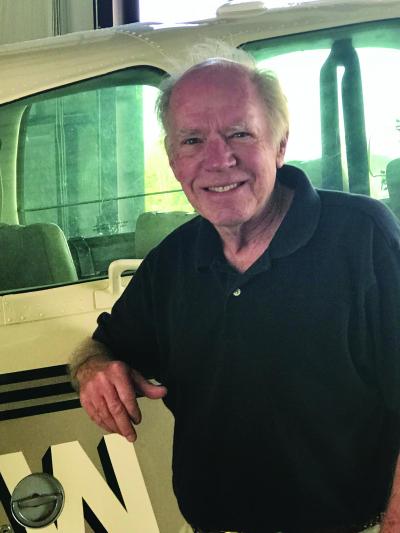Q&A with Carrie Oser
Alumna and professor in the Department of Sociology, associate director of the Center for Health Equity Transformation, and a faculty affiliate of the Center for Drug and Alcohol Research
A Winding Path to the Promised Land
Amy Murrell Taylor’s award-winning book “Embattled Freedom” chronicles the camps where formerly enslaved people congregated in the Civil War
By Richard LeComte
 Camp Nelson, a Civil War-era historic site south of Lexington, helps to fill a gap in the epic story of the end of slavery in the United States. At this site, along with about 300 others in the South, the camp offered refuge to people emancipated from plantations and a place where men could enlist in the Union Army.
Camp Nelson, a Civil War-era historic site south of Lexington, helps to fill a gap in the epic story of the end of slavery in the United States. At this site, along with about 300 others in the South, the camp offered refuge to people emancipated from plantations and a place where men could enlist in the Union Army.
A Phone Call That Made All the Difference
Statistics Department named for alumnus, generous donor
By Jay Blanton


 University of Kentucky faculty member Connie Wood accepted a collect call in 1989 from a student a world away who was in need of a connection and a path forward.
University of Kentucky faculty member Connie Wood accepted a collect call in 1989 from a student a world away who was in need of a connection and a path forward.
Probing Hispanic History and Activism
College’s new Latinx professors reach out to students of similar heritage
By Richard LeComte
 Teaching his first classes at UK in fall 2019, Eladio Bobadilla fresh from his doctoral studies at Duke—saw a lot of eager students waiting for him to share his perspectives on Latinx history. For many students in the class, Bobadilla was teaching something essential: their own histories.
Teaching his first classes at UK in fall 2019, Eladio Bobadilla fresh from his doctoral studies at Duke—saw a lot of eager students waiting for him to share his perspectives on Latinx history. For many students in the class, Bobadilla was teaching something essential: their own histories.
STEMCATs Program Bears Fruit
This Living Learning Program gives freshmen a mentored head start on the way to majoring in the sciences and mathematics
By Richard LeComte
 Started in 2015, the STEMCats Living Learning Program has helped students majoring within the many and varied areas of the sciences or mathematics find their way to success at UK. And STEMCats peer mentors are a big part of that effort.
Started in 2015, the STEMCats Living Learning Program has helped students majoring within the many and varied areas of the sciences or mathematics find their way to success at UK. And STEMCats peer mentors are a big part of that effort.
Celebrating Excellence: Hall of Fame 20 Year Anniversary
 Anne C. Deaton, English '67, has focused her career on the socio-economic, health and public policy issues related to seniors. In Columbia, Missouri, Deaton co-founded the Children’s Grove, an organization devoted to promoting a culture of kindness and supporting the health of young people through community education, the arts and the environment.
Anne C. Deaton, English '67, has focused her career on the socio-economic, health and public policy issues related to seniors. In Columbia, Missouri, Deaton co-founded the Children’s Grove, an organization devoted to promoting a culture of kindness and supporting the health of young people through community education, the arts and the environment.
Energizing a Career: Robert Stokes’ physics degree took his career from space science to energy technology
By Julie Wrinn
 Robert Stokes (Physics BS '64) came of age in the 1960s as part of a generation of American astrophysicists who were energized by the Soviet launch of the Sputnik satellite. He grew up in Ravenna, Kentucky, a tiny city in Estill County built up by the Louisville and Nashville Railroad in 1915.
Robert Stokes (Physics BS '64) came of age in the 1960s as part of a generation of American astrophysicists who were energized by the Soviet launch of the Sputnik satellite. He grew up in Ravenna, Kentucky, a tiny city in Estill County built up by the Louisville and Nashville Railroad in 1915.
Modern & Classical Languages, Literatures & Cultures Professor Adapts to Online Teaching
By Ryan Girves
This week marked the start of online learning for University of Kentucky students across campus following the announcement from President Eli Capilouto suspending all in-person instruction through the end of the spring semester in response to the coronavirus (COVID-19) pandemic.
UK is one of many universities to move its classes online using channels such as Zoom — a video conferencing platform — as part of an effort to de-densify campus.
